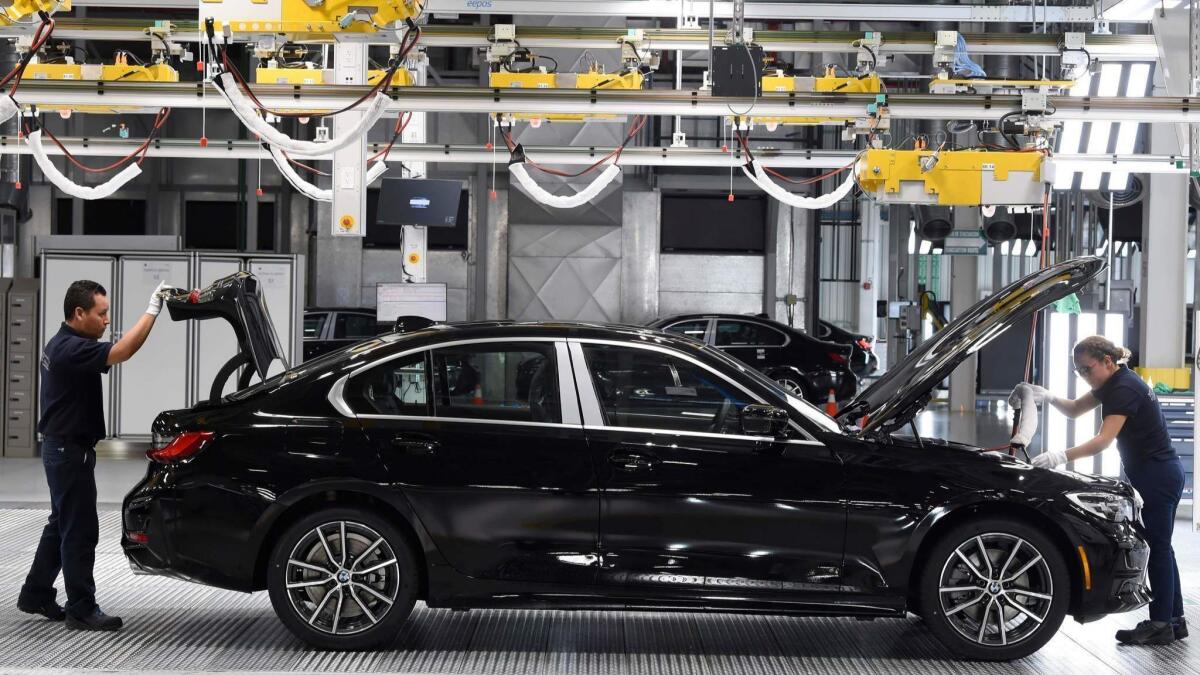BMW opens first Mexico plant as Trump tariff standoff builds

- Share via
BMW AG executives opened the automaker’s first Mexican assembly plant, extolling its value for the coming years just a week after President Trump threatened a fresh tariff threat on Mexican goods.
BMW spent about $1 billion on the plant, set in the vast arid plains of San Luis Potosi about four hours north of Mexico City. It’s one of three — the others are in Germany and China — that will produce the next-generation 3 Series sedan for sale in the U.S. and other markets.
The automaker has no reason to change its plans for the site because of the current political climate, BMW board member Oliver Zipse at its inauguration Thursday. The factory will supply more than 40 markets worldwide starting next year and “it would be very speculative to make decisions on short-term announcements,” he said.
The timing comes just days after President Trump threatened to impose a 5% tariff on all goods imported from Mexico, unless that country takes unspecified steps to stop illegal migration from Central America. The levies would escalate every month until reaching 25% in October according to the White House plan.
Those tariffs would inflict financial pain on BMW and its newest plant, said Kristin Dziczek, vice president of industry, labor, and economics at the Center for Automotive Research in Ann Arbor. “It hurts them a lot,” she said. “They’re there because they want to be part of North America, and North America is the U.S.”
With its low wages, free-trade pacts with multiple countries, and proximity to the world’s second-biggest car market, Mexico has lured a raft of automakers from Nissan Motor Co. to Volkswagen AG in recent years. That appeal is unlikely to change over this latest threat, in part because the factory is not dependent only on the U.S. BMW says the San Luis Potosi plant “will produce for the world.”
The plant is meant to primarily supply the U.S. and Mexico, with lesser amounts shipped to Central America and the Caribbean, according to LMC Automotive. It employs 2,000 people and is supposed to ramp up to a maximum capacity of 175,000 vehicles a year, though the pace may slow because of tariffs, according to Juergen Pieper, head of automotive research at Bankhaus Metzler.
A 5% tariff would add about $2,000-$2,500 of extra cost per vehicle, which might have negligible impact for a short time, but would put the 3 Series at a competitive disadvantage against the Audi A4, which is made in Germany, and the Mercedes C-Class, produced in Tuscaloosa, Ala., and South Africa, said Jeff Schuster, an analyst with LMC.
If tariffs climb all the way to 25%, it would cost between $10,000 and $12,000 more and essentially shut down production at the plant, Schuster said. BMW’s Munich plant could take over some production for the U.S., but couldn’t absorb all of it.
Sales of the 3 Series plunged 25% in the U.S. last year to 44,578 vehicles as consumers continued to migrate to SUVs. But it was still BMW’s best-selling model following the X3 and X5 crossovers.
More to Read
Inside the business of entertainment
The Wide Shot brings you news, analysis and insights on everything from streaming wars to production — and what it all means for the future.
You may occasionally receive promotional content from the Los Angeles Times.










